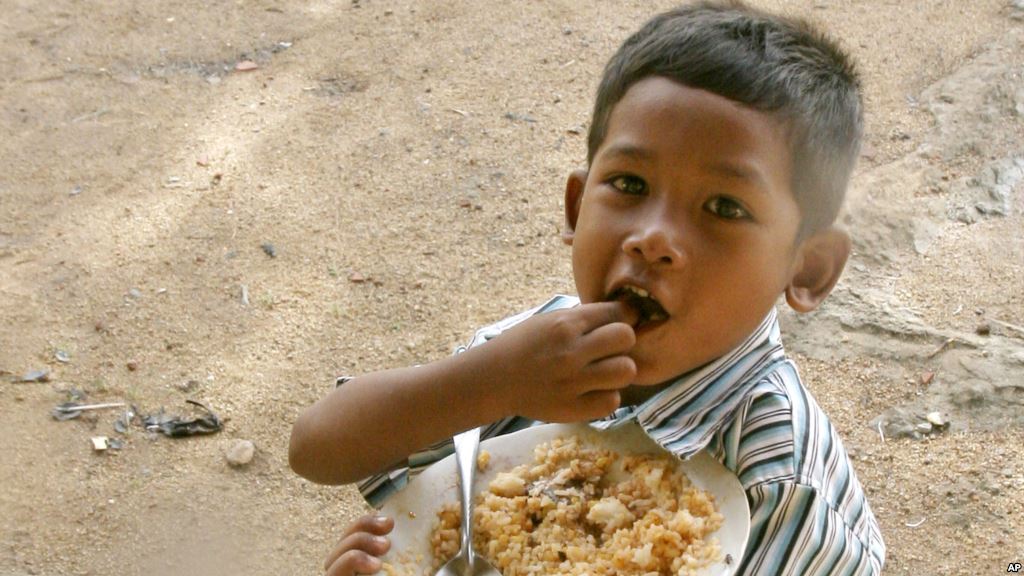VOA慢速英语:柬埔寨儿童营养计划工作取得进展
 |
Cambodia grows enough rice to feed its people. But millions still do not get enough vitamins and minerals. This lack of micronutrients affects mental and physical development and can cause lifelong problems.
Adding nutrients to food
Tim Green is a nutrition expert from Canada's University of British Columbia. He led a pilot food project in a rural province of Cambodia. It was successful in improving the nutrition of hundreds of families. Now, the program is expanding.
Mr. Green says that experts consider diversity of foods an important part of a healthy diet. Generally, he says, the more kinds of meat, rice and vegetables that people eat, the better. But he says that is not the case in Cambodia, even though diets are reasonably diverse.
"Because what we find is that people eat tiny little amounts of food. So they may report eating pork (pig meat) every day, but it may only be five to 10 grams."
The lack of nutrients is sometimes called "hidden hunger." It is especially a problem for children and women. For example, Mr. Green's research found that the lack of Vitamin B1 is common. This can result in very young babies dying in less than a day after showing signs of B1 deficiency.
But, adding Vitamin B1 to fish sauce can solve the problem. The sauce is commonly used in Cambodian foods. Mr. Green's team did just that.
"Fish on Farm" pilot program
The $3 million project is called "Fish on Farms." The pilot was carried out in southeastern Prey Veng province. It targeted 900 poor families. The goal was to improve nutrition by diversifying their food intake.
Organizers of the Canadian-funded project helped 300 families establish vegetable gardens. Another 300 got vegetable gardens and ponds in which to raise fish. The remaining 300 families were part of the control group and got nothing.
After three years the families with both fish ponds and vegetable gardens were doing better than those who only had vegetable gardens. All 600 families were doing better than the control group, says Tim Green.
"We saw increases in income, and that income was controlled by women and it was used mainly to buy other foods and education. We saw some improvements in other nutritional parameters."
The successes of the pilot were expanded to a larger program that is to start later in May. It will target 4,500 poor families in four provinces.
Zaman Talukder is a technical advisor on nutrition for Helen Keller International, a non-profit group involved in both projects. Mr. Talukder says the pilot food program increased the availability of different foods and the consumption of those foods by those who need it most: women and children. And he noted another benefit.
"...It gives additional income. It [is] also one of the best interventions to empower women who are the decision-makers for household consumption and family health."
The new program is different in several ways. First, it will require families to pay some of the costs to establish fish ponds, vegetable gardens or bird farms.
Also, families will receive advice on clean water, waste systems, and nutrition education. They will be able to borrow small amounts of money. Finally, the project will help them to sell extra food they produce.
The results from these two projects will be included in Cambodian policy plans for malnutrition. The country has come a long way in fighting hunger, but ending "hidden hunger" in Cambodia will take more work.
I'm Caty Weaver.
______________________________________________________________
Words in This Story
pilot – adj. (always used before a noun) done as a test to see if a larger program, study, etc., should be done
diversity – n. the quality or state of having many different forms, types, ideas, etc.
deficiency – n. a lack of something that is needed : the state of not having enough of something necessary
pond – n. an area of water that is surrounded by land and that is smaller than a lake
parameter – n. a rule or limit that controls what something is or how something should be done — usually plural
malnutrition – n. the unhealthy condition that results from not eating enough food or not eating enough healthy food
- 频道推荐
- |
- 全站推荐
- 推荐下载
- 网站推荐




















